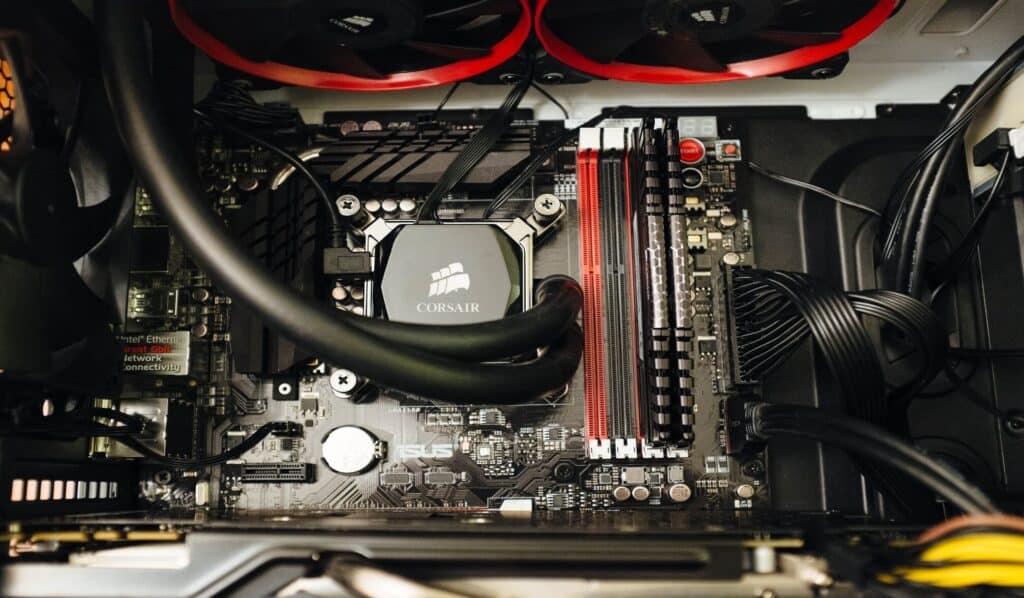Do AIO coolers leak? It’s a question that many PC enthusiasts ask themselves, especially those considering upgrading their CPU cooler.
The truth is that AIO leaks are very uncommon, but they can happen, especially if you encounter manufacturing defects or mishandling the cooler during installation.
In this article, we’ll explain all the potential causes of AIO leaks, how to detect them, and what to do if your AIO cooler does happen to leak.
Without further ado, let’s get started!
Potential Causes of AIO Leaks

One of the most common causes of AIO leaks is shipping damage. During shipping, AIO coolers can be subjected to bumps and jostles, which can damage the cooler’s components and lead to leaks. For example, micro-fractures in the cooler’s tubing or radiator may not be immediately visible, but they can eventually lead to leaks.
Another cause of AIO leaks is manufacturing defects. Although less common than shipping damage, manufacturing defects can also cause AIO leaks. For example, a misaligned seal or an improperly fitted tube may not cause any problems at first, but they can fail down the road.
Finally, AIO leaks can also be caused by pump issues. If the pump in an AIO cooler fails, it can increase internal pressure or disrupt the coolant flow, which can lead to a leak.
What Factors Can Increase the Risk of an AIO Leak?
There are a number of factors that can increase the risk of an AIO leak, including:
- Improper installation: Improper installation can damage the cooler and increase the risk of a leak. For example, over-bending the tubes or over-tightening the screws can damage the cooler and lead to leaks.
- Lack of maintenance: AIO coolers require regular maintenance to keep them in good shape. Lack of maintenance can lead to dust and debris buildup on the radiator and fans, which can reduce airflow and cause the cooler to overheat. This can put additional stress on the cooler and increase the risk of a leak.
- Manufacturing defects: AIO coolers are made up of many different parts, and even a tiny flaw in one of those parts can cause a leak.
- Physical damage: Physical damage to an AIO cooler, such as dropping it or bumping it, can also increase the risk of a leak.
- Wear and tear: Over time, the components in an all-in-one cooler can wear down, which can increase the risk of a leak.
How to Tell if Your AIO Cooler is Leaking
Spotting the Unwanted Drip: Visible Leaks
If you see any liquid dripping from your AIO cooler, or if there is a puddle of liquid in your PC case, it is a clear sign of an AIO leak.
This is the most obvious sign of an AIO leak, and it is important to act quickly if you see it.
The Silent Alert: Spiking CPU Temperatures

If your CPU temperatures suddenly start to rise, even when you are not doing anything demanding, it could be a sign of an AIO leak.
A leaky AIO cooler will not be able to cool your CPU as effectively, which will lead to higher temperatures.
Unexpected Shutdowns: Your PC’s Distress Signal
If your PC starts to shut down unexpectedly, it could be a sign of an AIO leak. This is because a leaky AIO cooler will not be able to keep your CPU cool enough, which can lead to overheating and shutdowns.
Unexpected shutdowns are a protective measure that your PC uses to prevent your CPU from being damaged due to overheating. If your PC is shutting down unexpectedly, it is important to investigate the cause of the problem.
If you suspect that an AIO leak may be the cause, you should inspect your AIO cooler for any signs of leakage.
Other possible causes of unexpected shutdowns include:
- Hardware failure: Other hardware components, such as the power supply, motherboard, or RAM, can also cause unexpected shutdowns.
- Software problems: Software problems, such as corrupted drivers or a faulty operating system, can also cause unexpected shutdowns.
Related: What to do if Your AIO Cooler is Not Cooling Your CPU
What Should You Do If Your AIO Leaks?

If you notice that your AIO cooler is leaking, the most important thing to do is to act quickly to minimize the damage to your PC.
- Shut down and unplug your PC: This will prevent any further electrical damage to your components.
- Remove the AIO cooler as soon as possible: Be careful not to spill any more liquid on your other components.
- Clean up any liquid that has leaked into your PC: Use a soft, absorbent cloth to gently dab away any liquid. If you find liquid in hard-to-reach spots, consider using compressed air to assist in the drying process.
Once you have cleaned up the leak, you can inspect your components for any damage. If you find any damage, you may need to replace the affected components.
Conclusion
We hope you find some helpful tips in this guide! If you’ve got any questions lingering or a cool story to share about your own AIO adventures, don’t keep it to yourself! Feel free to drop a comment below
We're an affiliate
We hope you love the products we recommend! Just so you know, gameraround.com is a participant in the Amazon Services LLC Associates Program, an affiliate advertising program designed to provide a means for sites to earn advertising fees by linking to Amazon.com.

